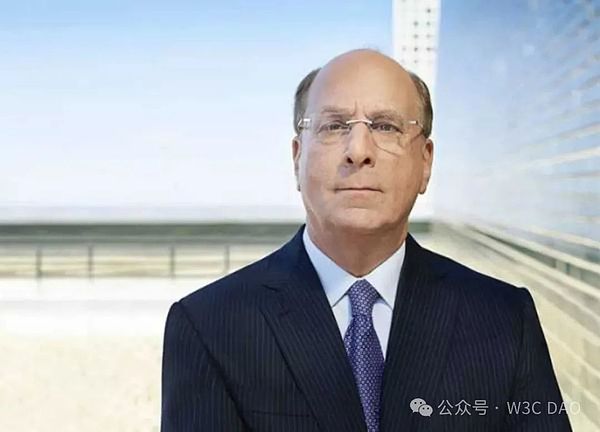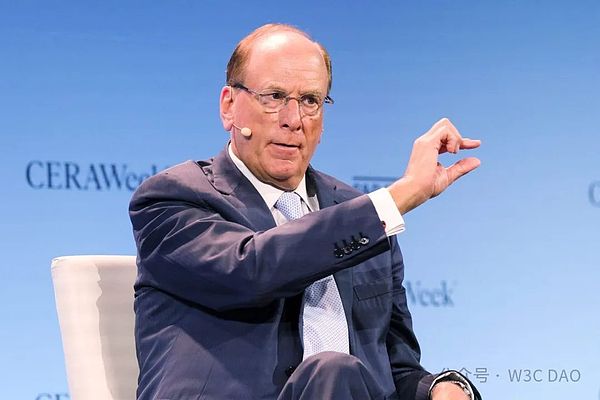Author: W3C DAO
According to Cointelegraph, BlackRock CEO Larry Fink said that the price of Bitcoin is expected to rise to $500,000 to $700,000.
"If you are afraid, or worried about currency devaluation, then you can view Bitcoin as a huge potential long-term means of storing value. It's like digital gold."
He also said, "Bitcoin is a ledger, but it is an international ledger that crosses borders. It is more powerful than any country. The emergence of Bitcoin ETFs is an example of how we legitimize this asset class."
In addition, Robert Mitchnick, head of digital assets at BlackRock, emphasized in an interview with CNBC Squawk Box that Bitcoin is not a high-risk asset, but a "global, scarce, non-sovereign, decentralized" token.
Mitchnick pointed out that some research and comments within the industry portray Bitcoin as a risky asset, leading to self-fulfilling market fluctuations. He believes that the impact of the US recession on Bitcoin is exaggerated and may even be a catalyst for it. In addition, he said that despite macroeconomic uncertainties, Bitcoin has risen by about 15% since November last year, calling 2024 a "historic year" and Bitcoin's long-term trend making it "digital gold." BTC Loyal Fans Larry Fink, CEO of BlackRock, the world's largest asset management company, is a loyal supporter of Bitcoin (BTC). Although he turned to Bitcoin (BTC) relatively late, he has now become one of the most influential advocates of Bitcoin.

For many years, the U.S. Securities and Exchange Commission has been hesitant to approve spot Bitcoin ETFs, partly due to concerns about market maturity and manipulation. (There are Bitcoin futures ETFs in the United States, but spot ETFs will give investors more direct access to Bitcoin).
One of Wall Street's leading financial institutions, BlackRock, expressed its efforts to legalize it and indicated that the market may have demand for such products. Subsequently, several other traditional financial institutions such as Fidelity, Franklin Templeton, VanEck, and many cryptocurrency upstarts such as Bitwise and Hashdex followed suit and began to apply to list their own Bitcoin ETFs.

A Bitcoin ETF is important because it allows more institutions to gain exposure to Bitcoin by holding stocks such as BlackRock's iShares or WisdomTree's BTCW, rather than holding Bitcoin directly. This means that retail and institutional investors can invest in Bitcoin through index funds.
Fink's View
Fink told Fox Business that BlackRock's clients have shown strong interest in cryptocurrencies and that BlackRock's products in the asset class are more "democratized." Fink also said that Bitcoin, as an open, verifiable, stateless currency, could become an increasingly important financial tool. Fink’s shift is noteworthy because it comes at a time when many in traditional finance are re-examining blockchain, especially the “tokenization” of real-world assets such as stocks and bonds. In the end, the future is digital, and the combination of traditional finance and blockchain is opening a new chapter. Bitcoin is increasingly being seen as a global store of value and a powerful financial tool. With the gradual legalization of Bitcoin ETFs, a large number of institutional and individual investors will be able to participate in the cryptocurrency market more easily, which not only marks the maturity of Bitcoin, but also promotes the popularization of the entire crypto ecosystem.
The transformation of Larry Fink, CEO of BlackRock, fully demonstrates that traditional financial giants are re-examining the potential of cryptocurrencies. From concern to support, this change not only reflects market demand, but also reflects the importance of cryptocurrencies in the future financial system.
With the continuous expansion of the application of blockchain technology, the tokenization of real-world assets such as stocks and bonds is becoming possible. Looking to the future, we may see a more open, transparent and borderless financial world from which both individuals and institutions can benefit. This is not only a technological innovation, but also a deep integration of traditional and modern finance. Let us look forward to this change and bring broader possibilities to the human economic system
 Aaron
Aaron
 Aaron
Aaron Kikyo
Kikyo Clement
Clement Hui Xin
Hui Xin Clement
Clement Jasper
Jasper Catherine
Catherine Clement
Clement Snake
Snake Alex
Alex